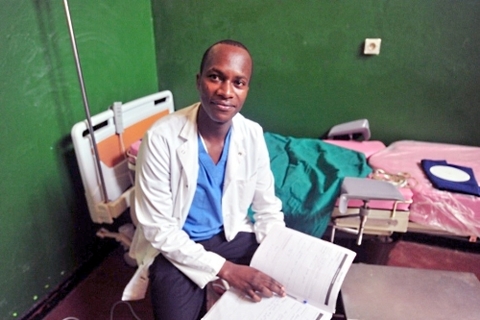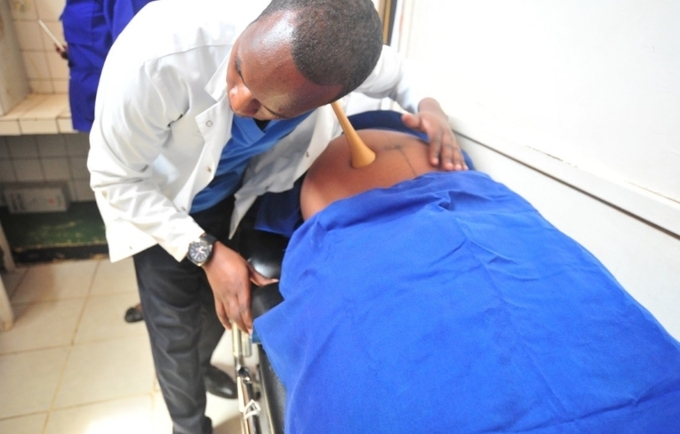Burcard Umuhoza, 28, a male midwife in Gisenyi district hospital in the Western province of Rwanda, has taken a personal oath to ensure motherhood is safe – starting with the hospital he works in.
He compares midwifery with an army in terms of preparedness and sacrifice, citing as an example the lives of those at risk being saved. A midwife is always alert, even when there is no patient in the labour room, like a soldier even during times of peace.
There is always a midwife on standby in the maternity ward to provide care to women and their babies to avoid post-partum complications.
“It is a proud privilege for me to be part of a team that saves the lives of women and their newborns,” says Mr. Umuhoza.
Striving to make motherhood safe is a call for everyone to answer, including the government, non-governmental organizations, civil society, academic institutions and especially health providers with midwives at the front line, he believes.
How did you choose midwifery?

“At first, it was curiosity that made me choose the profession,” he says. “I didn’t know much about midwifery when I joined the university but because there were very few male students I gave it a try. After two months, I developed an interest in what I had chosen.
“During my internship I enjoyed it more. The joy of a mother holding her baby was and will always be my strength. The wishes and promises of a mother after giving birth are sometimes beyond their capacity but I understand it’s the excitement and appreciation.
“Just days ago, a woman in labour told me: ‘Doctor, if I and my newborn baby survive, I will give you a cow,’ but in reality she had even no rabbit back home. Amazing!
“A mother’s trust in a midwife is the first medicine for a successful delivery. Unfortunately, the results are not always positive despite all efforts and interventions. Sometimes we lose mothers or babies and it greatly affects the physical, emotional and psychosocial wellbeing of health providers, even though this is usually overlooked.
“Midwives require counselling skills to prepare the mother for whatever outcome (she faces) and ensure the expectant mother has a safe delivery,” he says.
What are the challenges?
“A challenge that hurts a lot is that some women choose to deliver their babies at home and when they experience complications they rush to hospital, when their condition is critical.”
“My worst moment is to see a mother dying, despite all interventions. I become sleepless that night but I take courage and comfort myself in order to gain strength to care for those who will be coming the following day.
“When delivering at home, mothers and babies lose their lives due to complications that could have been prevented with emergency obstetric and neonatal care provided by midwives at health centres and hospitals.
There is a need to invest more in midwifery to reduce maternal mortality. - Burcard Umuhoza, midwife
“There are many challenges that midwives themselves face, some of them being related to availability of midwifery services. Midwives are underpaid compared to other professions and the low number of midwives makes the workload heavy and stressful,” he says.
The number of midwives in Rwanda (1268) remains well below the WHO standards of a minimum of 3660 midwives. Mr. Umuhoza advocates for increasing the number of midwives in the country. “There is a need to invest more in midwifery to reduce maternal mortality,” he says.
What is your advice?
“Midwifery is a calling that requires patience, passion and continuous professional development,” he says.
Midwives play a vital role in advancing targets set by government and partners, which impacts global progress in reducing child mortality, improving maternal health, and combatting HIV and AIDS. The journey to achieve these goals at all administrative levels requires the efforts of midwives, who play a critical role, particularly in the management of emergency obstetric and neonatal complications that claim the lives of many mothers and newborns.
UNFPA supports efforts to boost the number of competent midwives by strengthening midwifery education, regulation and associations, to ensure women’s health and wellbeing in pregnancy and childbirth. In addition, UNFPA invests in various efforts to advocate for midwifery across the globe. The expansion of the number of competent midwives working alongside other health professionals will contribute substantially to a reduction in maternal and child mortality.
By Maureen Twahirwa


